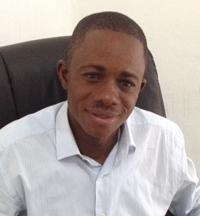
NRGI Knowledge Hub Program Alumni Story: Transforming Extractive Industries for Development in Francophone Africa
As an active member of a platform for organizations working on extractive industries in the Democratic Republic of Congo, Jean Pierre Okenda was very familiar with the subject before attending the two-week residential summer course hosted by the Catholic University of Central Africa in Cameroon.
However, this in-depth course gave a new dimension to his professional practice. The course’s emphasis on extractive sector governance was new to him.
“This type of training just doesn’t exist in the DRC,” he said of the course. “Governance issues are high on the agenda for everyone in Congo, and particularly in relation to the effective management of oil revenues as a public good. Yet, civil society is not very visible on these issues, largely due to lack of knowledge.”
 Name: Jean Pierre Okenda Country: DRC Profession: Consultant/researcher at the Carter Center. At the time of training Jean Pierre was Deputy Coordinator of the Platform of Civil Society Organizations in the Mining Sector. Course attended: Francophone Africa Summer School, Yaounde 2012 |
|
The DRC has extensive deposits of copper, cobalt and coltan, as well as diamonds, gold, tin, iron ore and oil. It produced 300,000 tons of copper and 3,600 carats of diamonds in 2009, making it the fourth-largest diamond producer in the world. In 2010, the DRC accounted for 51 percent of global cobalt production, and the extractive sector as a whole made up 20 percent of gross domestic product. |
On his return to the DRC, Jean Pierre was able to use his newly acquired skills in his existing functions and quickly became a highly sought expert on extractive industry governance and natural resource management.
The regional focus gave him an opportunity to learn from others in neighboring countries.
“It’s very encouraging to learn what others do,” he said. “It makes you feel part of a broader movement. It gives confidence.”
Knowing how to provide effective inputs into ongoing policy debates and the Extractive Industries Transparency Initiative (EITI) process also opened up new entry points for Okenda to influence ongoing dialogues.
His new insights were put to use while leading NGOs in their inputs to the revision of the country’s mining code, on behalf of the Platform of Civil Society Organizations in the Mining Sector. “It was the first time civil society engaged at that level of policy-making in the sector,” he recalled. The process included ensuring that civil society organizations from the mining province, Katanga, were part of the consultations.
Okenda also contributed to advocacy of the decentralization of EITI in the provinces. “I could use in particular the course material on how to advocate for increased transparency,” he says. The action led to the provincial government dedicating a proportion of its budget to EITI activities in Katanga province – something seen as an important step forward by the civil society platform.
Okenda worked at the Carter Center’s DRC office as an expert and researcher on natural resource governance issues. Through his work, he is able to support a multitude of stakeholders as they address the country’s policy challenges in relation to resource governance. Okenda now works with NRGI as DRC country manager.
The Francophone Africa Regional Knowledge Hub is a NRGI-Catholic University of Central Africa partnership and is intended to build capacity for shaping oil, gas and mining governance in the region. For more information on knowledge hub offerings, visit the Francophone hub page on NRGI’s website. The regional knowledge hub is one of six NRGI created in partnership with academic institutions to offer training and support for civil society organizations, members of parliament and journalists in Anglophone Africa, francophone Africa, Asia-Pacific, Eurasia, Latin America and the Middle East and North Africa. Learn more.